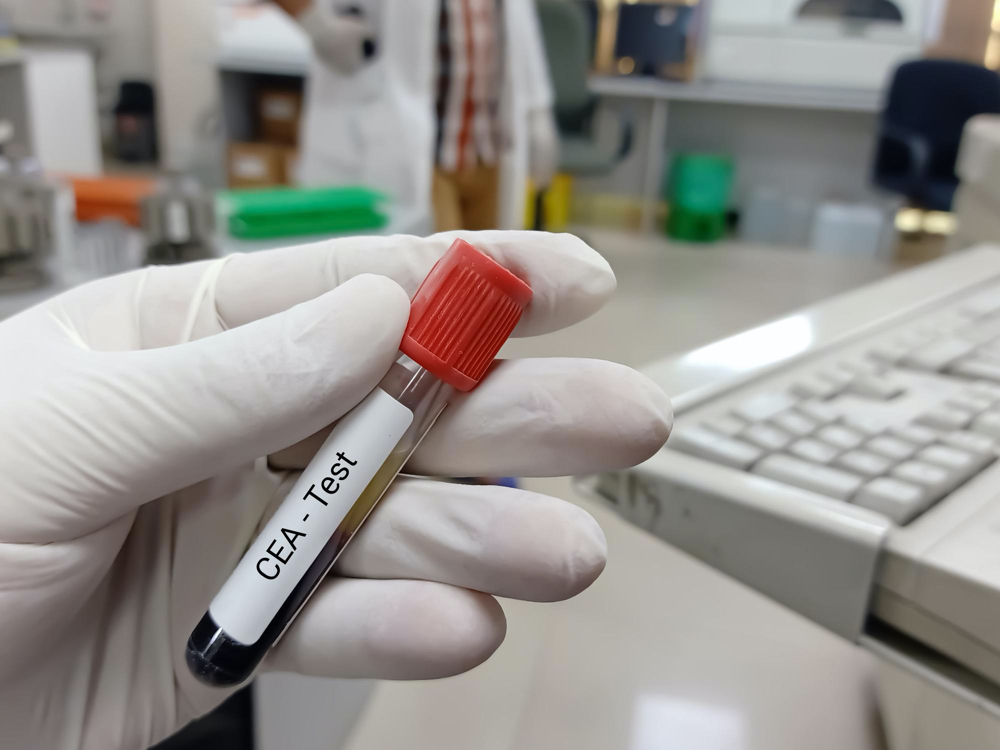- Fast results
- 4,000+ locations
- 4.8 star rating
Need Help? (888) GET LABS



High carcinoembryonic antigen or CEA levels are often associated with some cancers, most notably colorectal cancer. But there is more to CEA than simply a tumor marker.
CEA levels help detect cancer cells, but they also provide insights into other conditions like pancreatitis and thyroid disease. Hence, they are often part of the series of diagnostic procedures for malignant tumors and in monitoring the progression of cancer treatment. Doctors also request a CEA blood test to aid in diagnosing several gastrointestinal health issues.
Although knowing CEA as a tumor marker gives away its purpose, understanding its mechanism allows for a more on-point detection of its elevation and the corresponding cause. Find out how a CEA blood test is performed, its results meaning, and actions you can do to normalize it.
Carcinoembryonic antigen, or CEA, is a glycoprotein found in low amounts among healthy adults. Newborns typically have high CEA levels, specifically in their gastrointestinal tract. Then, it starts to drop down with age. Hence, adults only retain a small amount in their blood.
However, an elevated CEA commonly occurs among individuals with certain types of cancer. In fact, its discovery in 1965 was due to the isolation of metastasized liver tissue (part of the organ where cancer cells have spread) in a patient with colorectal cancer.
Since its discovery, CEA levels have been commonly used as a non-specific serum tumor biomarker for some cancers. It’s often requested as part of the early detection screening test, most notably for colon cancer. It also aids in understanding the stage and potential recurrence, as well as monitoring treatment response.
Cancers where CEA levels could elevate include:
On the other hand, you can still get elevated CEA even if you don’t have cancer. That is if you develop disorders that affect its production, such as Crohn’s disease, ulcerative colitis, hypothyroidism, pancreatitis, and chronic obstructive pulmonary disease (COPD). It could also appear higher than normal among smokers and patients with cirrhosis, as well as gallbladder problems.

With CEA acting as a marker for cancers of the colon, pancreas, thyroid, bladder, etc., a CEA blood test often becomes part of the laboratory procedures doctors recommend for early detection. Along with other critical tests, your healthcare provider gets a better understanding of whether or not you have cancer or other medical conditions requiring immediate attention.
A CEA blood test measures the amount of carcinoembryonic antigen (CEA) in the blood. This protein is known as a tumor marker for certain types of cancers. Additionally, it increases with non-neoplastic medical conditions, usually involving the gastrointestinal regions of the body.
To take a CEA test, you must secure a doctor’s order. However, if you decide to book your lab test online, you won’t need to visit your physician’s clinic. Instead, you will receive a document serving as the test’s lab order.
Once you have booked your CEA blood test, you don’t have to do any special preparation like fasting. If you’re a smoker, it’s best to abstain from cigarettes before the sample collection to get the best results.
A CEA lab test involves a simple procedure of drawing out a blood sample from your vein. Typically, you won’t experience any critical side effects apart from a slight sting. Still, if you observe bruising or allergic reactions after the blood collection, let your doctor or phlebotomist know immediately.
Did You Know? 1 in 4 adults have crippling fear and anxiety against needles. If you’re unsure how to manage your uneasiness around needles, read our tips for getting blood drawn during a lab test.
Unlike other diagnostic procedures, a CEA blood test cannot detect cancer or provide conclusive results on its own. This is why it is often requested alongside other lab tests, such as the CA 19-9 and CA 125 blood tests, as well as imaging tests like the CT scan, MRI, and ultrasound. It could also come after a biopsy is performed on a suspected malignant (cancerous) tumor.
Your CEA levels must fall between 0 to 2.5 ng/mL to be considered normal. Beyond this range, your doctor may order other tests to determine the cause of the elevation.
While the abnormal rise of CEA does not automatically suggest cancer, patients with colorectal cancer were found to have varying levels of increase in different stages.
For example, those with stage 3 colon cancer have CEA at 5 ng/mL or less, while patients with stage 4 colon cancer tested more than 5 ng/mL. CEA levels that are extremely elevated, such as going as high as 20 ng/mL, could suggest that cancer has started to spread to other tissues – a process called metastasis.
High CEA levels go beyond cancer, as it could also indicate other conditions. Likewise, some patients with colon cancer maintain normal CEA. Hence, the tumor biomarker can be slightly subjective.
However, it is valuable during cancer treatments as an indicator of its efficacy. You can take a CEA blood test before, during, and after treatment to monitor how well your body responds and if the cancer cells start to diminish.
The most effective way to lower CEA levels is to address the condition causing its abnormal increase. For example, if the elevated CEA is caused by cancer, surgically removing the malignant tumor allows for CEA to decrease to a normal level. Nonetheless, this could be attained if cancer has not spread to other tissues yet. Otherwise, CEA levels may remain high.
On the other hand, if the high CEA is due to other conditions outside cancer, treating the disorder could also normalize the protein secretion. Additionally, doing the following actions can aid in restoring wellness and help lower CEA levels naturally.
Elevated CEA caused by cancerous tumors requires proper treatment and guidance from your physician. Before taking the said actionable tips, specifically, those involving supplementation, consult your doctor first.
It’s possible to have elevated CEA even if you don’t have cancer. This is why a CEA test alone will not suffice to screen for cancer. Suppose the high CEA is not due to cancer. In that case, it could be associated with other benign or non-cancer conditions like gallbladder and liver problems and other gastrointestinal disorders.
According to a 2018 clinical evaluation, CEA has a sensitivity of 46.59%, which is higher than other diagnostic markers for colon cancer, such as cancer antigens like CA19-9, CA72-4, CA125, and ferritin. On the other hand, successive CEA is known to be up to 80% sensitive when detecting recurring colorectal cancer.
Research evidence suggests that CEA levels can increase in response to chronic and acute stress, primarily caused by restraint behavior or immobilization. On top of that, stress also contains tumor-growth-promoting factors, which elevate cancer biomarkers like CEA. Stress hormones also induce the proliferation of pro-tumor immune cells, inhibiting their suppression.
A CEA test is vital for detecting and monitoring some cancers. By understanding how malignant tumors elevate CEA in your blood and by taking the test during an earlier stage, you can seek treatment before the cancer cells spread.


We now offer pharmacy discounts through our PersonalabsRx platform.
We now offer pharmacy discounts through our PersonalabsRx platform.